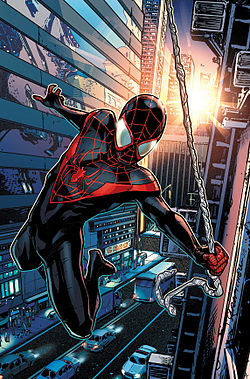Miles Morales
| Spider-Man | |
|---|---|

Miles Morales as Spider-Man
Art by Sara Pichelli |
|
| Publication information | |
| Publisher | Marvel Comics |
| First appearance | Ultimate Fallout #4 (August 2011) |
| Created by |
Brian Michael Bendis Sara Pichelli |
| In-story information | |
| Alter ego | Miles Morales |
| Team affiliations | Web Warriors The Ultimates Avengers Champions |
| Partnerships |
Spider-Man Nova Ms. Marvel |
| Notable aliases | Ultimate Spider-Man, Kid Arachnid |
| Abilities | Superhuman strength, speed, agility, stamina, reflexes and endurance Camouflage Venom blast and sting Precognitive Spider-Sense Ability to cling to most surfaces and shoot very strong spider-web strings from wrists via web-shooters |
Miles Morales is a fictional superhero who appears in comic books published by Marvel Comics, as one of the characters who goes by the identity of Spider-Man. The character was created by writer Brian Michael Bendis and artist Sara Pichelli, with Bendis and Marvel editor-in-chief Axel Alonso drawing inspiration from both then-U.S. President Barack Obama and American actor Donald Glover.
Miles Morales first appeared in Ultimate Fallout #4 (August 2011), following the death of Peter Parker. A teenager of Black Hispanic descent, Miles is the second Spider-Man to appear in Ultimate Marvel, an imprint with a separate continuity from the mainstream Marvel Universe. Although Morales featured in the Ultimate Comics: Spider-Man comic book series, he is not the lead character in the Ultimate Spider-Man animated TV series that debuted in April 2012 on Disney XD, but he was later added to the main cast in 2016. After Marvel ended the Ultimate imprint in 2015, Miles was made a character in the main Marvel Universe, beginning with stories under the All-New, All-Different Marvel brand published that same year.
Reaction to the character varied, with some, including Spider-Man's creator, Stan Lee, approving the creation of a positive role model for non-white children, to displeasure at the replacement of Peter Parker, with some decrying it as a publicity stunt motivated by political correctness, a charge Alonso denied. Alexandra Petri of The Washington Post called for the character to be judged on the quality of its stories, which have garnered positive reviews.
...
Wikipedia
